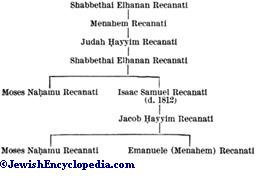Recanati
 From Jewish Encyclopedia (1906)
From Jewish Encyclopedia (1906) Recanati:
Italian family deriving its name from the city of Recanati in the former Papal States. Subjoined is the family tree:

The more important members are the following:
Amadeo (Jedidiah) ben Moses Recanati:Lived in the sixteenth century. He translated Maimonides' "Moreh Nebukin" into Italian in 1583, under the title "Erudizione dei Confusi," dedicating his work to the cabalist Menahem Azariah da Fano.
Elijah Recanati:Lived in the Romagna about 1660. At an advanced age he wrote a "widdui" in rimed prose, beginning "Ribbono shel 'Olam," and a lament for the wars, pestilence, and famine, which simultaneously afflicted the country.
- Zunz, S. P. p. 440;
- Vogelstein and Rieger, Gesch. der Juden in Rom, ii. 215.
Italian physician; born at Sienna in 1796; died at Verona, where his father had been rabbi, Jan., 1864. After studying medicine Emanuele practised as a physician at Verona. He was the author of: "Grammatica Ebraica in Lingua Latina" (Verona, 1842); "Dizionario Ebraico-Caldaico ed Italiano" ( ib. 1854); "Dizionario Italiano ed Ebraico" ( ib. 1856).
Jacob Ḥayyim Recanati:Rabbi and teacher; born in Pesaro 1758; died Feb. 27, 1824; son of Isaac Samuel Recanati. In his youth he was an elementary teacher at Ferrara, and later was successively rabbi of Sienna, Acqui, Moncalvo, Finale, Carpi, Verona, and Venice, in which last city he succeeded Jacob Menahem Cracowa. He was, moreover, a grammarian and a profound mathematician. Recanati was the author of several works, among them being the following: "Posḳe Reḳanaṭi ha-Aḥaronim" (Leghorn, 1813); a treatise on arithmetic, published at Sienna; a compendium of the doctrine of Judaism (Verona, 1813): and "Ya'ir Netib" (Dessau, 1818), a responsum on the Hamburg Reform Temple. He wrote also Hebrew poems, and left some collections of sermons in manuscript.
- Nepi-Ghirondi, Toledot Gedole Yisrael, p. 155;
- Steinschneider, Cat. Bodl. col. 1248;
- Divia, Elegia Funébre pel Rabbino de Verona, Giacobbe Vita Recanati, Verona. 1824.
Rabbi of the Spanish community of Ferrara in the second half of the seventeenth century. One of his responsa is contained in Jacob Recanati's "Posḳe Reḳanaṭi ha-Aḥaronim," § 5.
- Nepi-Ghirondi, Toledot Gedole Yisrael, p. 127.
Italian rabbi; flourished at the close of the thirteenth century and in the early part of the fourteenth. He was the only Italian of his time who devoted the chief part of his writings to the Cabala. He wrote: (1) "Perush 'Al ha-Torah" (Venice, 1523), a work full of mystical deductions and meanings based upon a textual interpretation of the Bible; it describes many visions and celestial revelations claimed to have been experienced by the author, who was blinded by cabalistic ideas, and expresses the highest respect for all cabalistical authors, even the most recent apocryphal ones. The work was translated into Latin by Pico di Mirandola, and was republished with a commentary by Mordecai Jaffe, at Lublin in 1595. (2) "Perush ha-Tefillot" and (3) "Ṭa'ame ha-Miẓwot," published together (Constantinople, 1543-1544; Basel, 1581). Like the preceding work, these are strongly tinctured with German mysticism. Recanati frequently quotes Judah he-Ḥasid of Regensburg, Eleazar of Worms, and their disciples, and alludes also to the Spanish cabalists, Naḥmanides among them. He is rarely original, quoting almost always other authorities. Although Recanati had a high reputation for sanctity, he exercised less influence on his contemporaries than upon posterity. To assist him in his cabalistic researches, he studied logic and philosophy; and he endeavors to support the cabala by philosophical arguments. (4) "Posḳe Hilkot," Bologna, 1538.
- Güdemann, Gesch. ii. 180 et seq.;
- Zunz, Literaturgesch. p. 369;
- idem, in Geiger's Jüd. Zeit. iv. 139;
- Gedaliah ibn Yaḥya, Shalshelet ha-Ḳabbalah, p. 48b.
Rabbi of Ferrara in the seventeenth century. He wrote a number of responsa, some of which are inserted in Jacob Recanati's "Posḳe Reḳanaṭi ha-Aḥaronim." (§§ 4, 6, 33). The legend related by Nepi, in "Toledot Gedole Yisrael" (p. 225), refers not to this Menahem, but to Menahem ben Benjamin Recanati.
- Gedaliah ibn Yaḥya, Shalshelet ha-Ḳabbalah, p. 48b;
- Steinschneider, Cat. Bodl. col. 1734.
Rabbi of Senigaglia and Pesaro in the eighteenth century.
Moses Naḥamu Recanati:Joint rabbi with his father-in-law, Moses Aaron Yaḥya, of Correggio at the beginning of the nineteenth century.
- Nepi-Ghirondi, Toledot Gedole Yisrael, p. 137.
Rabbi of Ferrara in the beginning of the seventeenth century. He lived at the time of the establishment of the ghetto.
- Nepi-Ghirondi, Toledot Gedole Yisrael, p. 335.
Rabbi for many years of the Spanish community in Ferrara. One of his responsa is inserted in the "Debar Shemuel" (p. 280) of Samuel Aboab. Approbations ("haskamot") by him are frequently met with, e.g. , in Lampronti's "Paḥad Yiẓḥaḳ," Jacob Daniel Olmo's "Reshit Bikkure Ḳaẓir," Samson Morpurgo's "Shemesh Ẓedaḳah," and Shulḥan 'Aruk, Yoreh De'ah, § 50. In the section Eben ha-'Ezer of the last-named work is included a responsum by Recanati on the writings of Maimonides.
- Nepi-Ghirondi, Toledot Gedole Yisrael, p. 319.
Other branches of the family are found in various Italian cities, e.g. , in Rome: Shabbethai Recanati (see MS. De Rossi No. 402); Maestro Joab in 1553 (see Vogelstein and Rieger, "Gesch. der Juden in Rom," ii. 420); at Santa Vittoria, Fermo: Jehiel ben Joab in the fifteenth century ("Mosé," v. 192); in Pesaro: in 1626, Lazzaro and Elia Recanati, bankers; Isaac di Salvatore, Jacob, and Abramo Recanati. In the nineteenth century the rabbinate of Pesaro was held by Giuseppe Samuele Recanati (b. at Pesaro in 1807; died there Oct. 15, 1894).
A branch of the Finzi family bears the cognomen "Da Recanati," and claims descent from the first Menahem Recanati (see
Categories: [Jewish encyclopedia 1906]
↧ Download as ZWI file | Last modified: 09/04/2022 17:06:08 | 16 views
☰ Source: https://www.jewishencyclopedia.com/articles/12615-recanati.html | License: Public domain
 ZWI signed:
ZWI signed: KSF
KSF